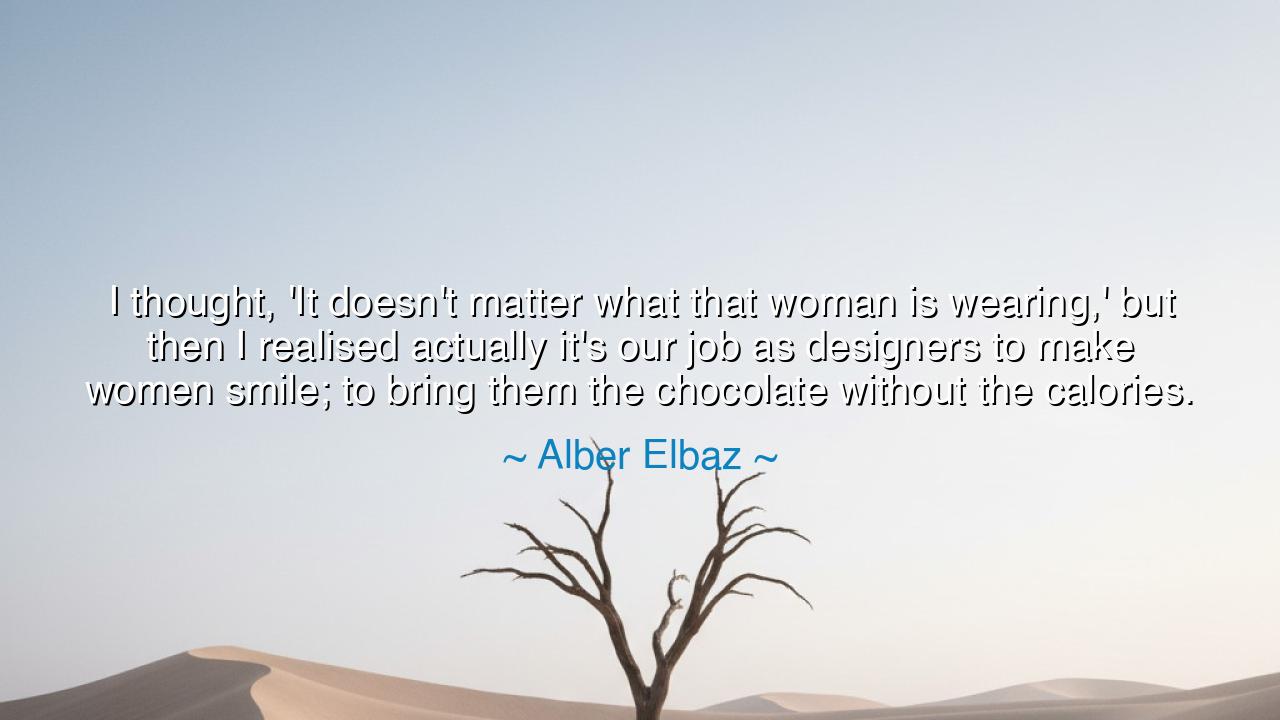
I thought, 'It doesn't matter what that woman is wearing,' but
I thought, 'It doesn't matter what that woman is wearing,' but then I realised actually it's our job as designers to make women smile; to bring them the chocolate without the calories.






Hear the words of Alber Elbaz: “I thought, ‘It doesn’t matter what that woman is wearing,’ but then I realised actually it’s our job as designers to make women smile; to bring them the chocolate without the calories.” At first, these words sound playful, even light, as if spoken with a wink. Yet within them lies a profound truth about beauty, joy, and the role of the artist. For Elbaz, the task of the designer was never simply to clothe the body—it was to awaken the spirit, to create delight, to give pleasure without harm, sweetness without bitterness, chocolate without the calories.
The ancients understood this paradox well. In Athens, the sculptors did not carve marble only to cover stone walls; they shaped gods and heroes so that men and women, when beholding them, would feel their hearts rise above the burdens of their daily lives. Beauty has always been nourishment, a kind of food for the soul. Yet unlike food, which fades with digestion, beauty lingers in memory. Elbaz’s words remind us that the work of the designer is to feed the soul as the baker feeds the body: to satisfy not hunger of flesh, but hunger of joy.
When he speaks of making women smile, he points to something more enduring than fabric or thread. Clothing may fade, trends may die, but the feeling a person carries when adorned in beauty lasts within them. Consider the story of Marie Antoinette, whose gowns and silks were mocked by history as excess. Yet in her own time, they were not mere garments but armors of spirit, bringing light to those who saw them amid political shadows. Even in captivity, she held dignity in her appearance. This shows us that beauty, when crafted with care, is not vanity—it is defiance against despair.
And what of the chocolate without calories? This is the heart of the metaphor. For humanity has always sought pleasures that do not destroy, delights that heal rather than corrupt. The artist’s task, like that of the healer, is to bring sweetness to life without burden. Music offers release without weight; poetry offers truth without chains; and fashion, in Elbaz’s vision, offers the joy of transformation without the sting of judgment. To wear something that makes the heart shine is to taste sweetness without regret.
Yet there is a deeper humility here, too. Elbaz confesses that he once thought clothing did not matter, that perhaps fashion was frivolous. But he came to see that what truly mattered was the smile—the transformation in spirit that beauty brings. The work of the designer is not about the garment itself, but about the woman who wears it, and how she feels when she sees herself renewed. To clothe another is, in this vision, to serve their soul.
The lesson is this: in whatever work you do, seek not only the function but the joy. Do not give people only what they need to survive—give them what makes them smile, what lightens the weight of their days. Whether you are a maker of songs, of words, of food, or of garments, ask yourself: does my work nourish the spirit as well as the body? Am I giving chocolate without the heaviness that follows?
So let us pass down this wisdom: beauty is not vain, joy is not shallow, and to make another human being smile is among the noblest labors. Follow the path of Alber Elbaz: create not only for necessity, but for delight. Offer the world not just garments, but gifts of spirit. For when we give to one another sweetness without sorrow, light without shadow, joy without burden—we give something eternal.






AAdministratorAdministrator
Welcome, honored guests. Please leave a comment, we will respond soon